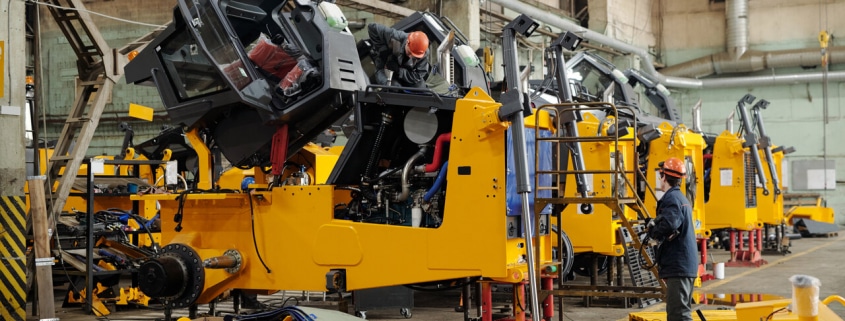How Does Industrial Subcontracting Work?
In the fast-paced world of business, companies often find themselves faced with the challenge of balancing their core competencies with the need for specialized services. That’s where industrial subcontracting comes into play. Industrial subcontracting is a strategic approach that allows companies to outsource specific tasks, projects, or processes to external parties, thereby maximizing efficiency and productivity. But how exactly does industrial subcontracting work? In this blog, we explore the ins and outs of this business practice, its benefits, and the key considerations for successful implementation.
What is Industrial Subcontracting?
Industrial subcontracting is a method of outsourcing tasks to specialized companies, allowing businesses to focus on their core competencies and increase efficiency. In the industrial production industry, subcontracting plays a crucial role in completing projects successfully and on time. When a company takes on a project, they often need specific expertise that they may not have in-house.
By hiring an industrial subcontractor, the main contractor can ensure that each aspect of the project is handled by experts in that particular field. For example, if a company needs a specific type of material for a product, they can hire a subcontractor that has a specialized skill set in handling plastics, or wood, depending on the material they need. This allows the main contractor to focus on other aspects of the project, knowing that the electrical work is being handled by professionals.
Subcontracting also offers flexibility to both clients and contractors. Clients can choose from a pool of experienced subcontractors who’ve proven track records in their respective fields. Contractors, on the other hand, can select subcontractors based on their expertise and availability for specific projects. This arrangement allows for efficient resource allocation and ensures that each task is completed with precision.
Benefits of Industrial Subcontracting
Industrial subcontracting offers several benefits for business owners engaged in manufacturing and other industrial sectors. Here are some of the key benefits of subcontracting:
Cost Efficiency
Subcontracting can help companies reduce costs significantly. Instead of investing in specialized equipment, hiring and training additional staff, and managing all aspects of production, subcontracting allows companies to outsource certain tasks to specialized subcontractors who already have the necessary resources and expertise. This can result in cost savings through economies of scale, reduced overhead expenses, and increased efficiency.
Focus on Core Competencies
By subcontracting non-core activities, companies can focus their resources and efforts on their core competencies. This means allocating more time, energy, and resources to activities that directly contribute to the company’s competitive advantage and core business functions. It allows companies to specialize and excel in their primary areas of expertise while leaving non-essential tasks to subcontractors.
Flexibility and Scalability
Subcontracting provides greater flexibility and scalability for companies. They can adjust their production levels and capacity according to market demand without the need to invest in additional infrastructure or human resources. Subcontractors often have the flexibility to scale their operations up or down quickly to accommodate the changing needs of the client company.
Access to Specialized Expertise
Subcontractors are often specialists in their respective fields, possessing specific expertise and knowledge that the primary contractor does not have. By subcontracting certain tasks or processes, companies can gain access to this specialized knowledge and experience without having to develop it in-house. This can result in higher quality outputs and improved efficiency since the subcontractor is likely to have a deep understanding of their specific area of expertise.
Risk Mitigation
Subcontracting can help mitigate certain risks associated with business operations. For example, if a company relies on a single supplier for critical components and that supplier experiences disruptions, it can significantly impact the company’s production capabilities. By subcontracting to multiple suppliers or subcontractors, companies can diversify their supply chain and reduce the risk of disruptions caused by a single point of failure.
Time Savings
Subcontracting can accelerate the production process and reduce time-to-market for products or services. Subcontractors often have established workflows, specialized equipment, and skilled labor that enable them to complete tasks more efficiently. By outsourcing certain processes, companies can save time and meet project deadlines more effectively.
Types of Tasks and Components Outsourced
Outsourcing tasks and components allows you to delegate specialized responsibilities, access a wider range of expertise, and save valuable resources. In the realm of industrial subcontracting, companies often choose to outsource specific tasks or components that are not part of their core manufacturing operations. By doing so, they can focus on their main areas of expertise while relying on external partners for specialized work.
Here are some of the most common types of contractors used for various tasks within the industrial manufacturing industry:
- Electrical and mechanical systems
- Molding materials
- Laser and plasma cutting
- Automation and robotics
- Water jet cutting
- Conventional and digital machinery
- Industrial paint applications
- Quality control and testing
8 must-know solutions for your needs in industrial subcontracting
Finding and Selecting a Reliable Subcontractor
When looking for reliable subcontracting firms, it’s important to find a partner who can effectively meet your specialized needs and enhance the efficiency of your operations. One crucial aspect to consider is whether the subcontractor has experienced full-time employees who are skilled in the specific tasks or components you need outsourced. Skilled employees will ensure that the work is done efficiently and up to industry standards.
Another key factor to consider when selecting a subcontractor is their compliance with legal requirements such as taxes and compensation insurance. It’s essential to choose a subcontractor who follows all regulations and properly compensates their employees. Additionally, they should have liability insurance in case any accidents or damages occur during the project. This provides protection for both parties involved – the prime contractor and the subcontracting business.
Furthermore, it’s important to assess if the potential subcontractor has experience working on similar projects in the past. A track record of successfully completing projects demonstrates their competence and reliability. You should assess the size of your current project and decide if their workforce can handle a larger project or is better suited to smaller projects.
How To Negotiate Contracts and Agreements With Subcontracting Firms
Negotiating contracts and agreements requires careful consideration of the terms and conditions to ensure a mutually beneficial partnership. When entering into a contractual agreement with a subcontracting company, it’s crucial to clearly define the scope of work, pricing, and delivery schedules.
By outlining these key factors in the contract terms, both parties can establish expectations and minimize potential misunderstandings. Additionally, discussing closure terms upfront can help address any issues that may arise during the subcontracting process, such as subcontractor default or delays.
It is important to remember that there are risks involved in this arrangement that must be addressed during negotiations. Autonomy in terms is an important aspect to consider when negotiating contracts and agreements. It’s essential to strike a balance between giving the subcontractor enough freedom to complete their tasks efficiently while maintaining control over critical aspects of the project.
To ensure a successful partnership, it’s crucial for both parties to communicate openly and honestly throughout the negotiation process. This includes discussing any concerns or potential risks associated with subcontracting. By addressing these issues upfront and incorporating them into the contract terms, both parties can mitigate risks and establish a solid foundation for collaboration.
Professional subcontracting services
Managing Relationships with Subcontractors
Establishing a strong and collaborative relationship with subcontractors is crucial for effectively managing projects and maximizing efficiency. When it comes to managing the relationship with subcontractors, communication is key. Regularly check in with your subcontractors to ensure they have a clear understanding of their roles and responsibilities within the project. This will help them stay on track and meet project deadlines. You should also address any key differences between the client and subcontractor in order to ensure communication lines stay open and friendly.
In addition to regular communication, it’s important to provide your subcontractors with all necessary project information upfront. This includes details about the project schedule, any potential risks or challenges they may encounter, as well as updates on any changes that may arise throughout the course of the project. By keeping your subcontractors informed, you can minimize disruptions and keep the project running smoothly.
Another aspect of managing the relationship with subcontractors is setting clear expectations from the start. Clearly communicate your client’s expectations as well as your own business administration requirements to ensure everyone is on the same page. This includes discussing payment terms, quality standards, and any specific deliverables that need to be met. By establishing these expectations early on, you can avoid misunderstandings or conflicts down the line.
Successful subcontracting relies heavily on building and maintaining positive relationships with specialized subcontractors. By prioritizing effective communication, providing comprehensive project information, and setting clear expectations from the beginning, you can foster a collaborative working environment that maximizes efficiency and ensures successful project completion.
Industrial Subcontracting Services
Subcontracting can greatly improve the efficiency of the manufacturing process and ensure your products are being made to the highest possible standard. At Groupe Hyperforme, we offer reliable, end-to-end subcontracting services that are adapted to meet the needs of today’s manufacturers.
Our services include:
- Metal processing
- Laser Cutting
- Wood and Rubber Processing
- Robotics
- Automation
- Electromechanics
- Composite and Plastics Processing
Whatever the needs of your company, we are dedicated to ensuring your manufacturing process is as efficient and cost-effective as possible!






